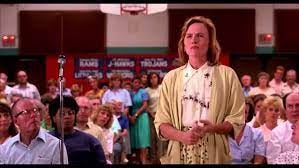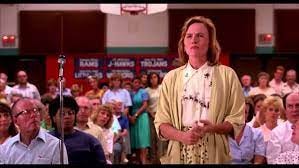Book Banning Could Be A Good Issue For Democrats, But It's Not A Sure Thing
Republicans aren't going to win a debate about Toni Morrison. They could win one about Gender Queer.
I've mentioned before that the core Democratic political problem right now is how the party is being held hostage by its activist class. It's not a new dynamic, but is more intense in the social media era when everyone fears a Twitter pile on. The Republicans' core problem, conversely, is ransom demands from the party's base. Few issues illustrate that better than the debate about book "bans." Book "banning" is one of these issues that though it's been with us for a while hardly anyone cared about 15 minutes ago. Now it's the only thing standing between us and fascism. At least until the next thing, which will be along soon.
President Biden is making book banning a big focus of his reelect message. Secretary of Education Cardona seems have picked it up to repeat as some sort of a nervous tic when various things come up. That's illustrative of the convention wisdom , which sees "book banning" as an absolute gift to the Democrats and something they should talk about as much as possible. And while it certainly has the potential to be a potent issue, I wouldn't get carried away.
Book bans are also one of those issues where the various combatants all have their own definitions. Historically, both the right and left have tried to get various books banned from schools for various reasons. Consequently, because the definitions are confused, the politics work in different ways for different players. Are we talking about literally banning books in bookstores? That's not really on the table, though restrictions by age are well-established. But hold on, many of the people most ready to pick up pitch forks now in the name of freedom to read were curiously struck mute when, for example, Abigail Shrier's book criticizing transgender care came on the market. Or they were on the side of the banners. An ACLU(!) official called for stopping the circulation of that book. Most people, you'll discover, aren't actually against censorship, rather, they're for restricting access to content they don't approve of (at any given point in time, the velocity around some of these issues is remarkable).
That's just one reason book banning is also one of those issues where the first answer to most questions or assertions should be more questions. What book? For what reason? In what venue? For what age? Calling for banning books in public libraries is different than school libraries, and school libraries are different than what's in classrooms and the curriculum. The specifics matter, and will matter in some key ways to the politics. And of course, book bans and general questions about education content and curriculum bleed together in the culture wars.
It's worth remembering that in public schools we restrict access to or make choices about content all the time. Choices about what gets taught and what doesn't are a fact of life. Sometimes that's around controversial content, mostly it's just the normal process of calls to change what is in or out of the 'canon' and as a nod to time constraints. Debating what's essential knowledge can be contentious, but it's a healthy activity for a society and schooling inherently requires choices.
Whatever party can grab the mantle of teaching rigorously about racism and discrimination without crossing the line into politics will hold the dominant ground.
Still, even within this confused environment there is an opportunity for Democrats. As we saw with Dobbs in 2022, people don't like rights being taken from them. Book banning polls badly. And Republicans have overreached. The pushback around books about Ruby Bridges, for instance, or Martin Luther King, understandably concerns pretty much everyone to the left of David Duke. If the Republicans can't get right on issues like that they will deservedly pay a price.
Have some schools crossed lines into clumsiness or straight-up political indoctrination? Of course. And not every issue being raised is unreasonable. Some schools are teaching CRT or "CRT-light," and not as one way some people understand the world or as a theory but as inarguable fact. At the same time, some schools cross the line into what a reasonable observer would consider racism. This sector struggles mightily to talk honestly about both those issues right now. "No one is teaching CRT, but if we did that would be good" seems to be the current party line from Democrats. Too many Republicans have turned into snowflakes about teaching the uglier parts of American history. One "side" can't get enough of essentialism, the other of exceptionalism.
Whatever party can grab the mantle of teaching rigorously about racism and discrimination without crossing the line into politics will hold the dominant ground. For Democrats getting there means saying no to activists, for Republicans it means defying the base and some loud but factional voices. There is some evidence the votes of parents are more in play than in the past.
The risk for Democrats, however, beyond blurring the lines of race and politics, is around age-appropriateness and gender theory and sexuality. The public is pretty clear that age-appropriateness matters to them - a lot. Where Republicans are pushing content restrictions into the upper-grades Democrats are pushing what's seen as questionable content into the younger ones. This is the Achilles' Heel of the idea this is a sure fire thing for Democrats. Caitlin Flanagan, a former English teacher and far from a book banner, pointed up the obvious liability here:
If the Republicans can instead make this issue about sexualized content in the early-grade, the idea that schools are foisting an agenda on kids, and age-appropriateness, the Democrats will regret having brought all this up. The Republican challenge is to cleanly break thorough on specific books in specific places, and specific age groups as exemplars. If they do, watch out. It's here the Democrats get cross pressured in the face of activist demands and is an aspect of the Democrats' broader basket of cultural liabilities. This was an issue in a few places in 2022, for instance Michigan where the state education agency had to pull back some content. It was swamped, though, by abortion politics and poor candidate recruitment by Republicans. The freelance problem and social media, however, magnify it and mean it can emerge in unpredictable ways.
Obviously, "Republicans" and "getting their act together" are not words that often appear in the same sentence these days. Right now the Republicans make the Democrats look downright Swiss. And leading Republicans are not helping themselves. A recent Florida move shows the basic problem. Here Republicans have - no limiting principle. The high profile Florida law restricting teaching about gender theory in K-12 was a lot more popular than you heard in the media. That's because there is majority support for restricting teaching about these issues in K-3, where we're taking about 5 to 8 year old children. Conversely, there is majority support for teaching these issues in high school. For instance, only 23% of independents support teaching about sexual orientation in elementary school but 64% do in high school. Yet Florida recently extended its K-3 ban to all grades.
Here's some recent Washington Post data on this question:
While some activists want schools to over-index on gender in the early grades and others do want a "don't say gay"culture, most people get that these are absurd extremes and are unwilling combatants in this culture war. The public seems to be able to keep multiple ideas in their head at the same time. In the same Washington Post poll 69% of adults supported laws to protect transgender individuals from discrimination in school.
The Republican challenge is to cleanly break thorough on specific books in specific places, and specific age groups as exemplars. If they do, watch out.
So there are some trapdoors the Democrats ought to be more wary of. Still, if you're handicapping this you have to give the edge to the Democrats. Biden enjoys some clear advantages here. He's the President, so speaks with one voice and a loud one, and the media rarely scratches below the surface to get at any of the nuance here and certainly won't if Donald Trump emerges as the Republican nominee and a second term is on offer. And so far there is no real primary to drag Biden leftward. Republicans, by contrast, speak with a lot of voices right now now and aren't going to catch many breaks in a media primed to magnify the most outlier voices and egregious cases if for no other reason than clicks. So far the Republican shadow primary has been one "hold my beer" episode after the next on this stuff.
In other words, a strong Democratic candidate will be clear about age-inappropriate content. Which isn't that difficult, even the authors of some of the books most at the center of today's debates say that, of course, those books were not meant for young children. A strong Republican candidate will take a firm stand on teaching about racism and history freeing them up to focus on more controversial content. The path is pretty clear, we'll see if either party gets there given the penchant of both to snatch defeat from the jaws of victory. Bottom line: If the Republicans can land on a message that highlights the Democratic liabilities here then the issue won't break as cleanly to the Democrats as people assume.
Meanwhile, outside the political hot house most people appreciate the differences between different venues, bookstores, libraries, school libraries, and classroom curriculum. They also appreciate that what's appropriate for a high school student might not be for middle school or elementary.
Our reactionary politics don't reflect the general common sense of the American people. Political actors have developed a taste for these fights, or profit from them with internet clout, dollars, or both. That, more than what your kids are reading or not reading at school, is the real reason we can't have nice things.






